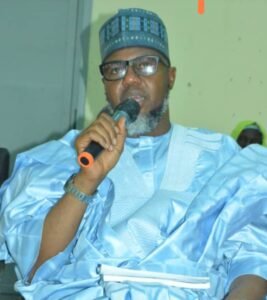
Power or Progress? The Impact of Long-Term Lawmakers on Yobe State Assembly and the Future of Democracy in Nigeria
By Muhammad M Maigari
In a democracy, the continuity of leadership is often viewed through two lenses: stability and stagnation. A recent analysis revealed a compelling breakdown of the years spent by members of the Yobe State House of Assembly. It highlights a striking pattern some lawmakers have been in office for over two decades, with Chiroma A. Buba Mashio (Fune II) serving 26 years, and Buba Ibrahim Kalallawa (Damaturu II) clocking 25 years.
This article dives deep into the advantages, disadvantages, and implications of prolonged legislative stay in the context of Yobe State, draws comparisons from other Nigerian states, and makes recommendations for a healthier democratic system.
The Yobe Assembly Breakdown: A Snapshot
1 lawmaker have served 26 years
1 lawmaker have served 25 years
2 lawmakers have served 18 years
3 lawmakers have served 14 years
6 lawmakers have served 10 years
5 lawmakers have served 6 years
6 lawmakers have served over 2 years.
This shows a clear concentration of power in a few hands a trend that raises both eyebrows and important questions.
The Double-Edged Sword of Longevity
Advantages:
1. Experience & Institutional Memory
Example: Yobe State House of Assembly (Chiroma Buba Mashio)
Chiroma Buba Mashio, Speaker and member representing Fune II, has served since 1999. His deep knowledge of legislative processes and budgeting procedures has made him instrumental in stabilizing the Assembly and ensuring smooth passage of bills and appropriations. During debates on the 2024 state budget, his command of procedure and understanding of inter-agency coordination helped avoid delays in budget implementation.
2. Political Stability
Example: Lagos State House of Assembly (Rt. Hon. Mudashiru Obasa)
Obasa has been a member of the Lagos Assembly since 2003 and Speaker since 2015. His continuity has provided stability in leadership, allowing for the consistent pursuit of mega city transformation policies. His tenure saw the passage of over 40 laws without leadership crises, including the Lagos Neighborhood Safety Corps Law, which enhanced community policing.
3. Influence & Network
Example: Delta State House of Assembly (Sheriff Oborevwori)
Before becoming Governor, Sheriff Oborevwori served as Speaker of the Delta Assembly for over 6 years. His close ties with federal actors and Delta’s elite enabled him to attract federal infrastructure projects, including road expansion funds for Delta Central. His experience helped the Assembly push key policies into national discourse.
Disadvantages:
1. Lack of Fresh Ideas
Example: Kano State House of Assembly (Pre-2019 Legislature)
Before the 2019 shake-up, Kano Assembly was dominated by long-serving legislators. Despite facing growing urban challenges, they failed to push progressive bills around digital governance, youth employment, or open government transparency. Younger aspirants who had fresh ideas were marginalized at the party primary level, resulting in legislative stagnation.
2. Power Monopoly
Example: Kogi State House of Assembly (2015–2019)
In Kogi, certain constituencies were effectively held by political godfathers, recycling the same family names or loyalists. Kabiru Umar (Dekina) served three terms, allegedly blocking rivals from primaries through party influence. This choked political competition and entrenched patronage politics, sidelining grassroots voices.
3. Reduced Accountability
Example: Taraba State House of Assembly (Uba Maigari Era)
Uba Maigari served several consecutive terms, but by his final years, his attendance at plenary dropped, and constituency projects were either uncompleted or untracked. Despite complaints from constituents, he secured party tickets uncontested. It took a youth-led voter awareness movement in 2023 to finally unseat him through the ballot box.
Case studies: Lessons from Other States
1. Kano State – The Kabiru Gaya Phenomenon: Senator Kabiru Gaya served for over 15 years. Though respected, he was criticized for not mentoring new leaders and clinging to outdated methods.
2. Lagos State – The Rise of Youth: In contrast, Lagos Assembly saw a youth wave in 2019 that brought in tech-savvy, reform-driven lawmakers. This shift increased transparency and modern legislation.
3. Taraba State – The Uba Maigari Case: Serving 20+ years, Uba was voted out in 2023 by a 35-year-old first-timer a sign that constituents are demanding change.
What Does It Mean for Yobe?
Yobe State is at a democratic crossroads. While experienced lawmakers may provide continuity, the over concentration of leadership hinders generational change and wider participation. Most importantly, a lack of vibrant turnover risks disconnecting governance from the evolving needs of constituents.
Recommendations: The Way Forward
1. Constitutional Amendment for Term Limits: Like executive roles, state legislators should be limited to a maximum of three terms (12 years) to encourage circulation of ideas and leaders.
2. Stronger Civic Education: Voters need to understand the power of their vote and demand performance, not personality.
3. Encourage Youth Participation: Political parties must support and groom young and competent candidates.
4. Public Debate Culture: Encourage town halls and debates where aspiring lawmakers face constituents and outline measurable plans.
Conclusion
Democracy thrives not in the length of service, but in the quality of service. While some of Yobe’s long-serving lawmakers may have earned their stripes, it is vital that the democratic process reflects representation, renewal, and responsibility. It’s time to ask not just how long, but how well.
08067800348
muhammadmaigaribaba@gmail.com


